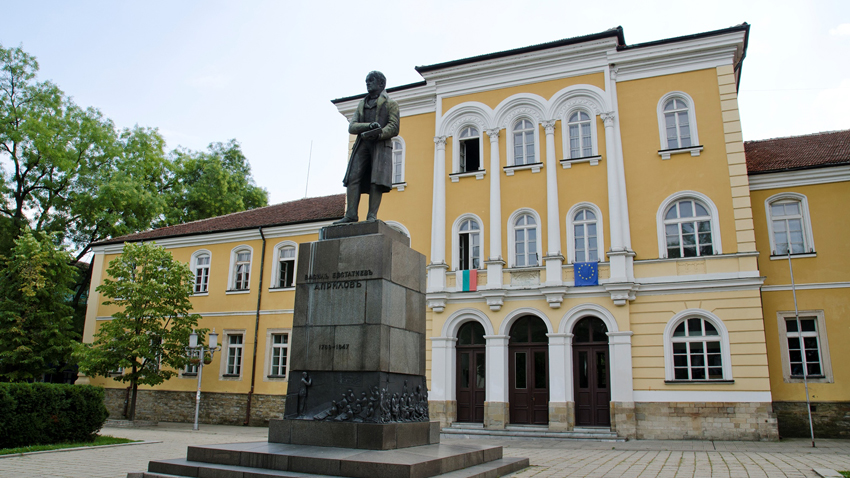The first Bulgarian secular school was launched in the town of Gabrovo (Central North Bulgaria) some 180 years ago. This school used the teaching method of British pedagogues Bell and Lancaster. According to this method, advanced students help younger pupils in their studies. Of course, the process was conducted under the guidance of the local teacher. The first teacher in that school was renowned Bulgarian revival leader Neophyte of Rila. Vassil Aprilov, Nikolay Palauzov and the Mustakov Brothers were among the biggest benefactors of the school. Other Bulgarians who lived abroad also provided financial assistance to the school. They used to pay remunerations to the teachers and scholarships of the graduates, so they could continue their studies. Vassil Aprilov, however, should be viewed not only as the person who was the forefather of the new Bulgarian education and benefactor of the Bulgarian educational system, but also as the one who outlined the future development of the new Bulgarian education. Together with Nikolay Palauzov, Vassil Aprilov served as principal of the school in Gabrovo. Moreover, Aprilov was a successful tradesman who contributed a lot to the development of economic ties with Russia. On the other hand, he gave his contribution to the cultural development of the town of Gabrovo and of other Bulgarian districts.
“Vassil Aprilov’s first work was entitled Dawn of the New Bulgarian Education published back in 1841” The keeper of the Regional Historical Museum in Gabrovo Daniela Tsoneva told Radio Bulgaria. “He issued the same year another book entitled The Bulgarian Books and which Slavic Tribe the Slavonic Script Belongs To. One year later he published a sequel to the Dawn of the New Bulgarian Education., followed by Bulgarian Honour Diplomas in 1845 and his last work Reflections on Present-Day Bulgarian Education in 1847. In other words, in seven years only he published five whole works, which contributed to the development of the Bulgarian literature and the promotion of education in this country.”

The Regional Historical Museum in Gabrovo keeps valuable evidence linked with Vassil Aprilov’s life, including letters to his sister Kera, his books and family belongings.
“Although his letters addressed to his sister Kera were quite personal, they are also an evidence of his great aspiration towards the preservation of the Bulgarian traditions. For instance, he was asking his sister to look for certain Bulgarian songs related to love, engagement, marriage, etc. Besides, he was advising his sister what types of women and ladies to hire for the performance of these songs and to remunerate them for their labor, if they were coming from poor families. In one of his letters, Aprilov shared his idea about the establishment of a women’s school. Indeed, Gabrovo was the second Bulgarian town after Pleven, which gave the start to female education in this country.”
Vassil Aprilov was assisted by Neophyte of Rila and other compatriots in the search of antiquities. One of his ideas regarded the arrangement of various materials in one collection. Vassil Aprilov was regarded as one of the forefathers of the scientific field of the growing Bulgarian historiography, due to his live interest in archeological monuments and historical documents. He was the first Bulgarian who introduced the term archaeology. On the other hand, Aprilov promoted the new education in one of his works, mentioning that 6 years after the establishment of the first secular school in Gabrovo, a whole network of similar schools emerged in Bulgaria: in the towns of Panagyurishte, Sopot, Karlovo, Tryavna, Kazanlak and Svishtov. Vasil Aprilov presented Gabrovo as the center of this holy deed in comparison to the experience of some developed European countries. He used to call this town a “seed-bed of Bulgaria’s education”. That is why in 1872, only six years before the liberation of Bulgaria from the Ottoman Yoke, the school in Gabrovo turned into the first secondary school in this country. Today The Aprilov National High School in Gabrovo is among the most prestigious schools in Bulgaria. The heritage of its renowned patron and rich history resulted in the establishment of the National Museum of Education.
English version: Kostadin Atanasov
The Bulgarian Orthodox Church celebrates Christmas with solemn services. The festive services began on Christmas Eve, when the church held a solemn vigil. Hundreds of laypeople gathered at the St. Alexander Nevsky Cathedral in Sofia, where..
This year, the holiday of Christmas for the Bulgarian Eastern Orthodox Diocese in the United States, Canada and Australia is especially exciting! Metropolitan Joseph’s long-standing prayers to have his own vicar bishop have come true. His previous..
His Holiness Daniil, Patriarch of Bulgaria and Metropolitan of Sofia, addressed the Orthodox Christians on the eve of the bright Nativity of Christ (Christmas Eve). "Silent in prayer, gathered around the warm hearth, we await the fulfilment of what was..
The fighting for Sofia within the framework of the Russo-Turkish War (1877-1878) began on December 25, 1877. On January 3, 1878, the city's commandant..

+359 2 9336 661
